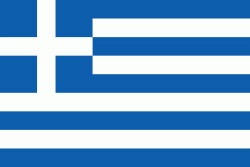Koroni (Koróni)
The town was founded in ancient times. The 2nd century Greek geographer Pausanias in his book Messeniaka reports the original location of Koroni at modern Petalidi, a town a few kilometers north of Koroni. He also reports many temples of Greek gods and a copper statue of Zeus. In the centuries that followed the town of Koroni moved to its current location, where the ancient town of Asini had once stood. In the 6th and 7th centuries AD, the Byzantines built a fortress there.
The town appears for the first time as a bishopric in the Notitiae Episcopatuum of the Byzantine Emperor Leo VI the Wise, in which it appears as a suffragan of the See of Patras. Surviving seals give the names of some of its Greek bishops. The Greek eparchy was suppressed in the 19th century as part of an ecclesiastical reorganization after Greece gained its independence.
Map - Koroni (Koróni)
Map
Country - Greece
 |
 |
| Flag of Greece | |
Greece is considered the cradle of Western civilization, being the birthplace of democracy, Western philosophy, Western literature, historiography, political science, major scientific and mathematical principles, theatre and the Olympic Games. From the eighth century BC, the Greeks were organised into various independent city-states, known as poleis (singular polis), which spanned the Mediterranean and the Black Sea. Philip II of Macedon united most of present-day Greece in the fourth century BC, with his son Alexander the Great rapidly conquering much of the ancient world, from the eastern Mediterranean to the North Western parts of India. The subsequent Hellenistic period saw the height of Greek culture and influence in antiquity. Greece was annexed by Rome in the second century BC, becoming an integral part of the Roman Empire and its continuation, the Byzantine Empire, which was culturally and linguistically predominantly Greek.
Currency / Language
| ISO | Currency | Symbol | Significant figures |
|---|---|---|---|
| EUR | Euro | € | 2 |
| ISO | Language |
|---|---|
| EN | English language |
| FR | French language |
| EL | Greek language |















